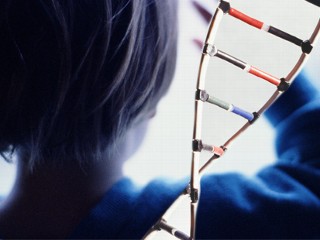
From HealthDay News
Multiple, interacting genetic risk factors may influence the severity of autism, a new study suggests.
Massachusetts Institute of Technology researchers said they've pinpointed two genes that cause autism-like symptoms in mice. The findings support a long-held theory that more than one gene is involved in people with genetic-based autism.
The researchers said their discovery could lead to the development of drugs that target signaling mechanisms between genes that interact to cause some symptoms of autistic spectrum disorders (ASDs).
The study found that mice with mutations in two different candidate autism susceptibility genes -- PTEN and the serotonin transporter gene -- had more severe symptoms than mice with only a single mutation. Mice with a mutation in PTEN alone or in the serotonin transporter gene alone had brains that were larger than normal, while mice with mutations in both genes had even larger brains.
About 24 percent of people with autism have larger-than-normal brain size. In people with ASDs, brain size is correlated with the severity of behavioral problems, the researchers said.
The MIT study also found that female mice with a mutation in the PTEN gene had impaired sociability, and those with mutations in both PTEN and the serotonin transporter gene had more severe symptoms.
"We found that two genetic risk factors for ASDs act cooperatively in mice to influence brain size and social behavior, both of which are altered in ASDs," lead investigator Damon T. Page, a postdoctoral fellow at MIT's Picower Institute for Learning and Memory, said in an MIT news release.
"Our results provide evidence that the severity of autistic symptoms may be the product of variations in DNA in multiple locations in the genome," Page added.
The study was published in the Feb. 9 online edition of the journal Proceedings of the National Academy of Sciences.
Source: http://health.usnews.com/articles/he...in-autism.html
Please share this article with friends, family, Facebook and MySpace family.




No comments:
Post a Comment